Navadurga
| Navadurga | |
|---|---|
Power, strength, protection, knowledge, wealth, fertility and Moksha | |
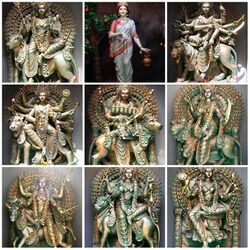 Navadurgas – the nine forms of Durga | |
| Affiliation | Adi Shakti, Durga, Lakshmi[citation needed], Parvati, Devi |
| Mantra | oṁ aim hrīṁ śrīṁ mahādurgāyai namo namaḥ |
| Weapon | Khanda (sword), Bow and arrow, Trishula, Sudarshan Chakra, Gada (mace), shield, shankha, Ghanta |
| Mount | Lion, tiger, nandi, ox, mule and lotus |
| Festivals | Navaratri, Durga Puja, Vijayadashami, Durga Ashtami |
Navadurga (Sanskrit: नवदुर्गा, romanized: Navadurgā), also spelled Navdurga and Navadurgas, are nine manifestations and forms of Durga in Hinduism,[1][2] especially worshipped during Navaratri and Durga Puja.[3] They are often considered collectively as a single deity, mainly among the followers of Shaktism and Shaivism sect of Hinduism.[4][4]
According to Hindu mythology, the nine forms are considered the nine stages of Durga during the nine-day long duration of the war with demon-king Mahishasura, where the tenth day is celebrated as the Vijayadashami (lit. victory day) among the Hindus and is considered as one of the most important festivals.[5]
Background
During the festival of Navaratri, nine unmarried virgin girls up to the age of nine years are worshipped and fed as they are considered to be the incarnations of these nine goddesses.[6] Then, the Nabapatrika ritual during Durga Puja involves tying the branches of eight plants with their leaves with a banana plant (naba meaning 'nine', and patrika meaning 'leaves').[7]
The nine forms
The main nine forms of Durga worshipped in Hinduism:
| S. No. | Image
(Depiction) |
Name | Vahana | Stage[upper-alpha 1] | Mantra | Depiction | Ref | ||
|---|---|---|---|---|---|---|---|---|---|
| 1. | 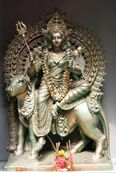
|
Shailaputri
"Daughter of Mountain" |
Nandi (bull) | Parvati in her stage of childhood with the divine and principal form being Durga | ॐ देवी शैलपुत्र्यै नमः | She is adorned with light ornamentation on her limbs and was clothed in red and pink robes. She has two hands both holding a trident and lotus. She is seated upon the behind of a white bull. | [9] | ||
| 2. | 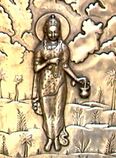
|
Brahmacharini
"Mother of devotion and penance" |
None | Durga in her phase of asceticism. | ॐ देवी ब्रह्मचारिण्यै नम: | She is dressed as a female ascetic and is adorned by dried-up Rudraksha beads and flowers as her ornamentation. She has two hands, both of which carried a rosary and a water utensil. | [10] | ||
| 3. | 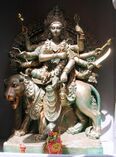
|
Chandraghanta
"Destroyer of demons" |
Tiger | Durga in the form of Shakti. | ॐ देवी चंद्रघण्टायै नम: | She has ten hands, nine of them are armed by a trident, mace, bow, arrow, lotus, sword, bell and a waterpot, while one other hand blesses her devotees. She is seated upon a fierce tiger. | [11] | ||
| 4. | 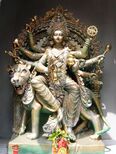
|
Kushmanda
"Goddess of The Cosmic Egg" |
Lion | Durga in the form of Mahashakti. | ॐ ऐं ह्रीं क्लीं कूष्मांडायै नम: | She has eight hands, six of which held a discus, mace, lotus, bow, and arrow in one hand, sword and rosary and the two other hands carried a jar of honey and waterpot. She is mounted upon the back of a lion. | [12] | ||
| 5. | 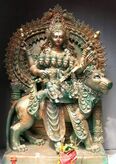
|
Skandamata
"Goddess of motherhood and children" |
Durga in her stage of motherhood. | ॐ देवी स्कन्दमातायै नम: | She has four hands, two of which held lotuses, the third holding her son, the six-headed infant Kartikeya seated on her lap, and the fourth saves her devotees. She is seated upon the back of a lion. | [13] | |||
| 6. | 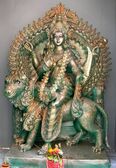
|
Katyayani
"Goddess of Power" |
Durga in the warrior stage. | ॐ देवी कात्यायन्यै नम: | She is adorned with heavy ornamentation on her limbs and is dressed in green and pink vestments. Her four hands each carried a sword, shield, lotus and trident. She's seen seated on a fearsome lion. | [14] | |||
| 7. | 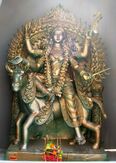
|
Kalaratri
"Goddess of Auspiciousness and Courage" |
Donkey | Durga in her form of destruction. | ॐ देवी कालरात्र्यै नम: | She has three bloodshot eyes, unkempt hairs, and wears a garland of skulls around her neck, which shone like lightning. Her four hands all held a trident, scimitar, vajra, and a cup. She is seated upon the behind of a donkey as her vehicle. | [15] | ||
| 8. | 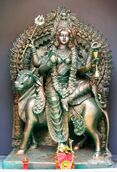
|
Mahagauri
"Goddess of Beauty and Women" |
Ox | Durga in her form of recovery. | ॐ देवी महागौर्यै नम: | She has four hands, three of which carried a trident, mini-drum, and a pink lotus while her one hand promised her devotees protection. She is seated upon a white ox. | [16] | ||
| 9. | 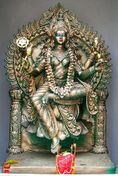
|
Siddhidhatri
"Goddess of Supernatural Powers or Siddhis" |
Lotus | Durga in her stage of reaching her highest and supreme form as Mahashakti. | ॐ ऐं ह्रीं क्लीं सिद्धिदात्यै नम: | Each of her four hands carried a discus, conch shell, pink lotus and a mace. She is seated upon a fully bloomed lotus. | [17]
Other listsAccording to traditions and Hindu scriptures Navadurga has different forms. The Agni Purana lists them as:[18]
See also
ReferencesNotes
Citations
Sources
|


